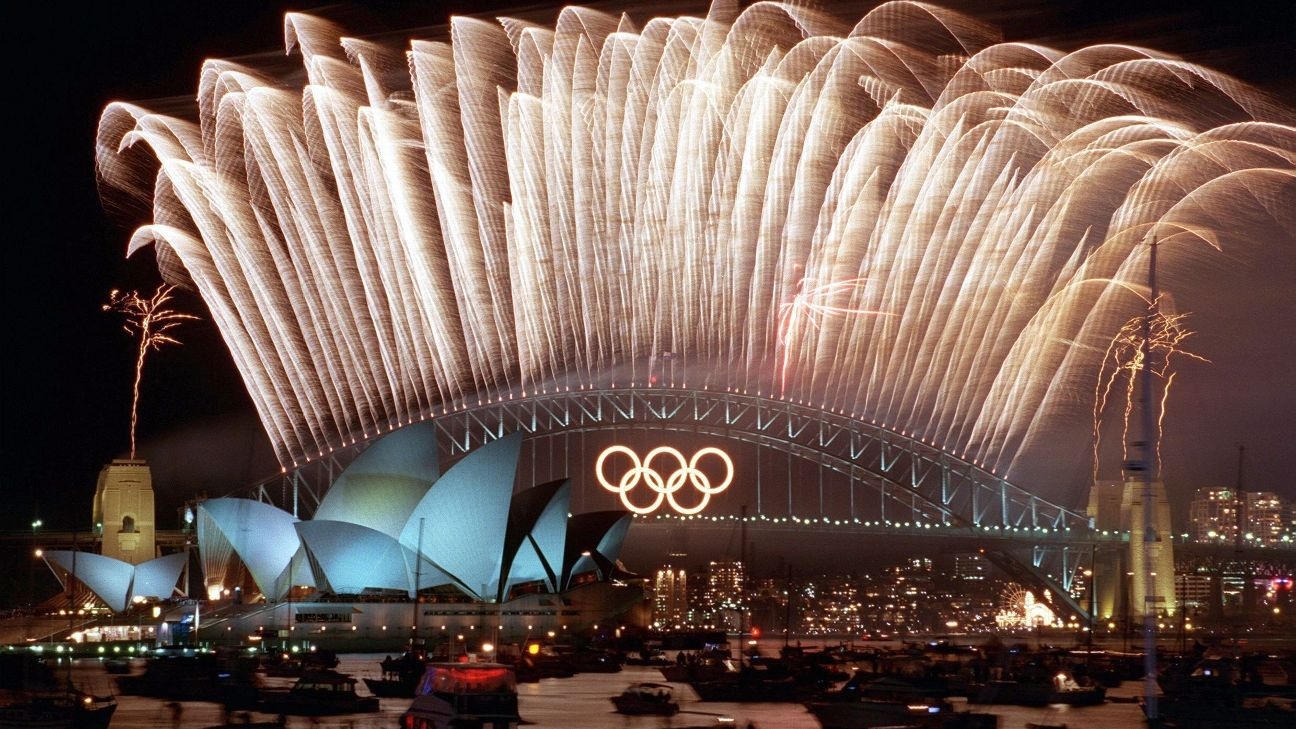
The tale tells of a French historian, Pierre de Coubertin, who at the age of just 30 organised, in the name of amateurism and universal peace, the first Olympic Games in modern history, in the capital of the same Greece that had invented the Olympics over two thousand years earlier[1]. No one has ever thoroughly analysed what actually happened. Where the money came from, the political influence, the organisation (Athens, at the time, was a very poor fishing village), and the political drive. In the fable, there is only room for good feelings.
Yet, right from the start, the Olympic Games, like the World’s Fair, became the first two major manifestations of globalisation – both of them of the French brand. Today, more than a century later, the blunder of amateurism is only a memory, and the objective of organising the Olympics a manifest operation of economic, commercial, political and diplomatic marketing. Moreover, like all such terrestrial events, the Olympics are the ideal biotope of corruption.
In the history of the modern games, the XXVII edition (Sydney 2000) is considered one of the best ever held[2] and, therefore, probably also holds the sad record of corruption, starting with the influence within the International Olympic Committee (IOC)[3]. This body decides who organises, which disciplines have the right to be part of it (the exclusion of the modern pentathlon and some wrestling specialities has in fact killed these sports, which are no longer practised by anyone, as there is no attractive international showcase)[4].
The organisation of the Games, for a city, means worldwide visibility, increased tourist flows, the development of infrastructure, financial investment, national pride as internal political cement[5]. And then there is the sporting and passionate side, which makes an event unforgettable – and Sydney has not been stingy in this respect: the thrilling baseball final between the United States and Cuba[6]; the feat of the US decathlete Chris Huffins, bronze for managing to improve his personal best by 12.5 seconds in a harrowing 1500-metre race[7]; the gold medal haul by Dutch cyclist Leontien van Moorsel, back on the road after years of illness[8]; the bronze in the pole vault by Vala Flosadóttir, the first woman to give Iceland an Olympic medal[9]. As for the hosts, the Sydney Olympics were those of swimmer Ian Thorpe, who won three golds and two silvers[10].
Story of a great Australian victory
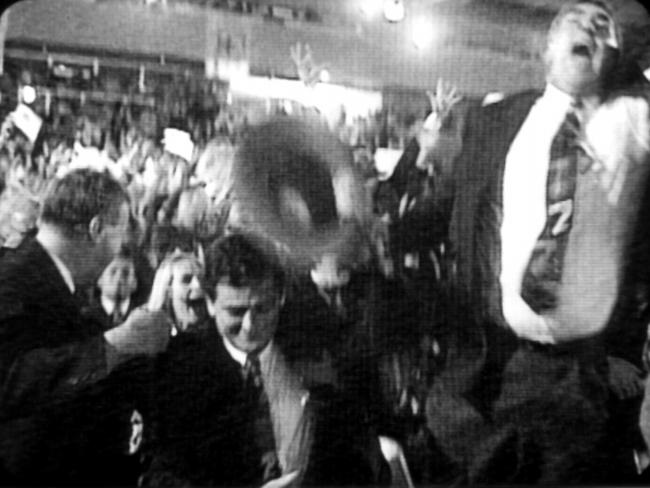
23 September 1993: IOC President Juan Antonio Samaranch has just announced the decision to hold the 200 Olympic Games in Sydney, and the Australian delegation explodes with joy[11]
Once the party is over, no one asks what happened in the award process. Sport wins, in the public memory, and the Olympics, even today, turn boys and girls into eternal heroes. When the curtain falls, the IOC has already decided who will be awarded not only the next Olympics, but also those to be held eight years later. The complex political, diplomatic and lobbying decision has already taken place, and those who had to be paid have already pocketed it.
Sydney’s bid was born in November 1990[12] and became a reality in November 1993[13]. The company managing the bid for the games (Sydney Olympics 2000 Bid Ltd. Sydney) is swarming with influential people: members of the NSW government (of which Sydney is the capital[14]), Sydney City Hall and the Australian Olympic Committee-AOC[15]. One of them is John Dowling Coates, a lawyer and entrepreneur, who has been the president of the AOC[16] (now also vice-president of the IOC[17]) since 1990, while the CEO is Rod McGeoch, a business lawyer and powerful man in Australian sport[18].
During his career within the AOC, Coates fought for Brisbane’s bid for the 1992 Games (awarded to Barcelona)[19], the city for which it recently won the 2032 Games[20]. He then led the campaign to bring the 1996 Games, later awarded to Atlanta, to Melbourne[21]. These experiences turned out to be crucial: when Sydney entered the race in 1990, he knew exactly what to do to convince the IOC members to choose Australia over Manchester[22], Berlin[23] and, above all, Beijing, the most likely aspirant for victory[24].
The election process begins with a visit of the IOC evaluation committee to the candidate city. The Australian airline Qantas sells them tickets at a 40 per cent discount, and in the city the luxurious hotels are free for them. They are taken to visit the competition venues aboard the helicopters of Kerry Packer[25], one of Australia’s leading media tycoons[26]. This makes the public suspicious. In early 1999, Tom A. Sheridan, former Auditor General of South Australia[27], is commissioned by NSW Olympics Minister Michael Knight to conduct an independent review of the activities of Sydney Olympics 2000 Bid Ltd. in order to ascertain any wrongdoing or misconduct.
The results were released in March 1999[28]: the Sheridan report revealed several breaches of the lines relating to the offering of gifts to IOC members, the limit of which is set at $200[29]; two IOC members also travelled to European sporting events paid for by the Sydney Bid Committee: Dane Niels Hølst Sørensen and his wife attended the 1993 French Open tennis final, while Irishman Kevin O’Flanagan and his brother were in the audience at the 1992 Wimbledon final – both at the expense of the Sydney Bid Committee[30].
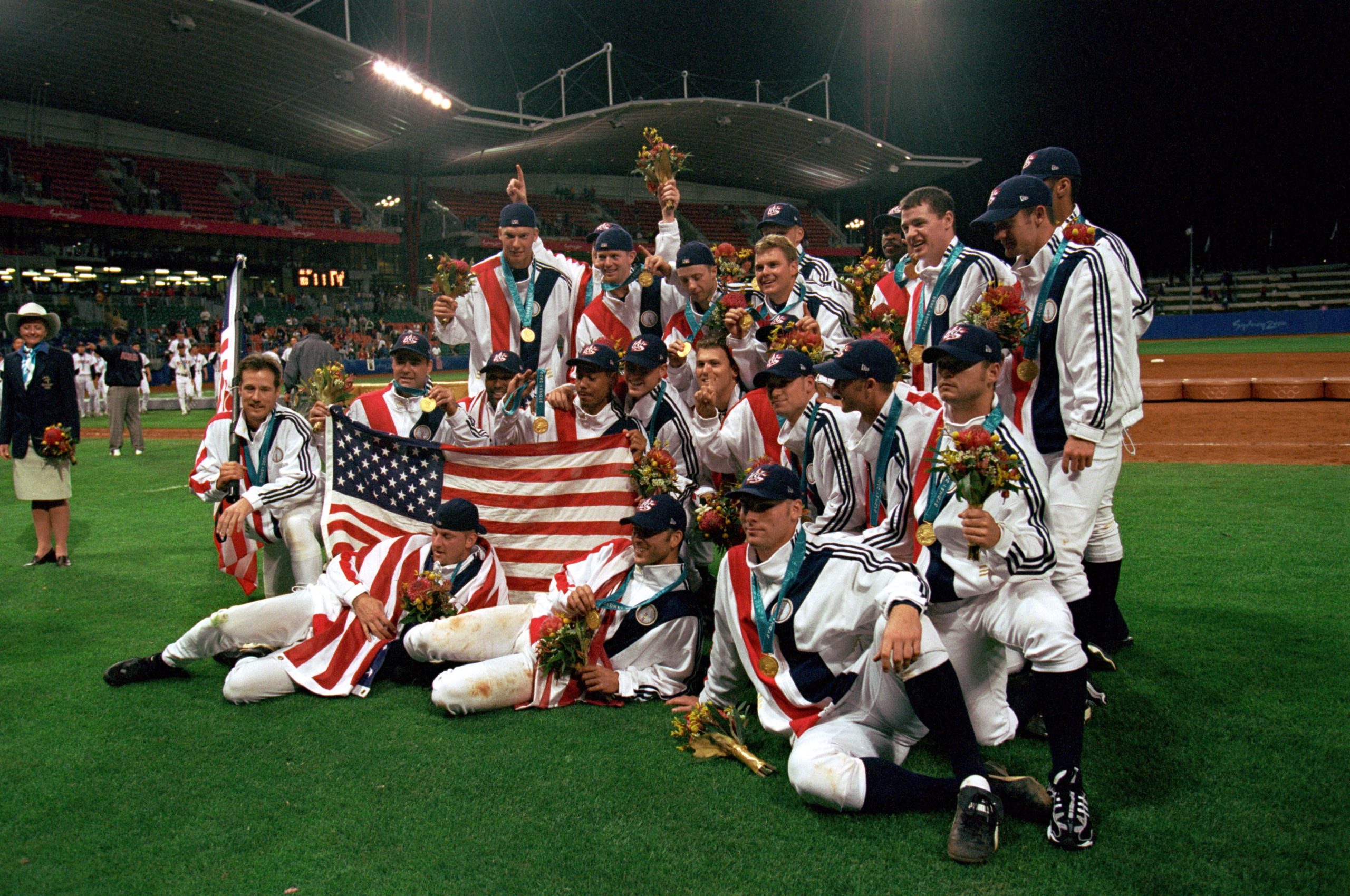
Sydney 2000: US national baseball team celebrates after a hard-fought final against Cuba[31]
Several visits to IOC members from other nations, made by the CEO of the Sydney bid, Rod McGeoch, violated IOC guidelines: to Mongolia, Brazil, Argentina, Venezuela, Mexico and India[32]. In May 1991, the Bid Committee became interested in a young Romanian couple eager to emigrate to Australia, Dana and Nicholae Voinov, daughter and son-in-law of IOC Romanian member Alexandru Siperco. The Sheridan Report suggests that bringing the two young people to Australia and finding them employment was worth Siperco’s vote for the Sydney candidacy[33].
In December 1992, Mongolian delegate Shagdarjav Magvan visited the Taronga Western Plains Zoo in New South Wales[34], home to 24 Przewalski horses, also known as Mongolian Wild Horses, which are close to extinction in their homeland[35]. Following that visit, the Australian Prime Minister, the NSW Zoological Parks Board, Sydney Olympics 2000 Bid and the Government of Mongolia negotiated the transfer of some of the horses. In 1995, seven specimens (two from Adelaide’s Monarto Zoo and five from the Western Plains Zoo) of Przewalsky were moved to Ulan Bator[36] at a total cost of AUD$240,000 – and by Magvan’s vote[37].
Also according to the Sheridan Report, IOC officials are repeatedly hosted free of charge in Sydney and in different parts of the country[38]. Nevertheless, Australian committee members are concerned about the strength of Beijing’s bid, especially after learning that the then FIFA president, Brazil’s João Havelange, is pushing South American and African members to vote for the Chinese capital[39]; McGeoch then sets up a public relations firm in London with the intention of attacking China on human rights; the Australian government, fearing disastrous consequences in terms of international relations, blocks the campaign before it begins[40]. John Coates does not give up and offers, a few hours before the vote, USD 35,000 each to the IOC delegates from Kenya and Uganda, officially as support for their respective countries’ Olympic activities[41].
Between 24 July and 20 August 1993, Coates visited 11 African countries with the aim of strengthening relations with local Olympic committees[42]. During the visit, cooperation agreements were signed with the Olympic committees of Nigeria, Ivory Coast, Mali, Togo, Cameroon, Kenya, Uganda, Swaziland, Mauritius, Congo and Zimbabwe: Coates pledges AUD 2.05 million (including minor support to Thailand, Argentina and Colombia), paid by Sydney 2000 Olympics Bid Limited to the AOC (responsible for distributing support to individual federations) between September and December 1993[43]. Since these payments are to the federations, and not to individual IOC members, this passes without scandal[44].
Two professional lobbyists were hired, Mahmoud El Farnawany and Gabor Komyathy, the former (Africa and Asia) for 180,000 Australian dollars, the latter (Eastern Europe) for 200,000 Australian dollars[45]. The Australian IOC delegate Phil Coles carries out identical activities in Paris: he dines with various IOC members, attends sporting events, sends regular reports to members of the Sydney 2000 Olympics Bid; the expenditure for the lobby team in Paris is approximately AUD$160,000[46]. Sheridan emphasises in his report how the lack of precise indications regarding lobbying in the IOC guidelines makes these activities de facto non-sanctionable, even though they are blatantly contrary to the spirit of the Olympic Games[47].
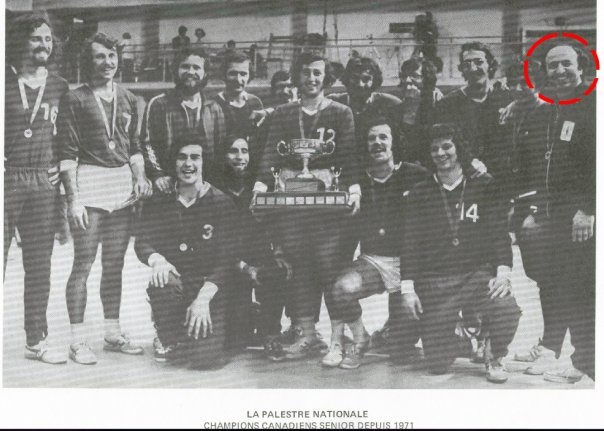
12 February 2022: Former Egyptian-Canadian volleyball player and coach Mahmoud El Farnawany dies at the age of 89, avoiding an enquiry into money he received as a lobbyist for Sydney 2000[48]
On 23 September 1993 the IOC chose Sydney, instead of Beijing, by 45 votes out of 89 IOC delegates[49]. The first official step is the Host City Contract, which is signed on 23 September between the IOC, the AOC and the City of Sydney: John Coates’ AOC is guaranteed 90% of the profits from the Games, with the remaining 10% going to the IOC. The NSW Government is left out of the split[50]. The government’s disappointment is enormous, given that the state has paid AUD$60 million for the cost of organising the Games, has committed to the infrastructure, and is left with nothing[51]. By virtue of the Endorsement Contract of 1991, the AOC – Coates again, then – has veto power over any matter concerning the budget of the company set up to organise the Games, the Sydney Organising Committee for the Olympic Games (SOCOG). But at the poker table of the Olympics every weakness, naivety and incompetence is severely punished: Australian politics pays for everything and keeps the debts, while the profits go to SOCOG[52].
This is a public body, and could be controlled by Parliament, but in fact the statute states that the consent of the AOC is needed to amend the Endorsement Contract and that of the IOC for the Host City Contract[53]. Therefore: the Sydney Olympics are nominally privately run but publicly funded, while in fact it is still a public body (SOCOG) that oversees the work leading up to the event[54]. Serious, in all this, is the absolute lack of transparency (and, at the time, the lack of media coverage) of the contracts in question and, above all, the consequences they would have on Australian taxpayers[55]. The SOCOG board is majority appointed by the government, but is unstable, prey to conflicts of interest between NSW and AOC.
Tensions are running high as Coates continues to assert his veto on the budget and does not want to give up his share of the profits; the internecine war begins to claim victims: on 6 March 1996 entrepreneur Gary Pemberton resigns as chairman of the board, being replaced by John Iliffe[56]. Michael Knight became Minister for the NSW (New South Wales)[57] Olympics when Bob Carr’s Labour government was elected in 1995[58]. Presidentialist, with a practical approach to the management of the Games, Knight was one of the architects of the solution to the dangerous stalemate of the SOCOG board, which was found on a Sunday in March 1996, during a dinner in a Chinese restaurant between Coates and Knight, called “The Night of the Long Prawns”: the agreement was that Knight would guarantee the television rights for a fixed sum for the AOC, which in exchange would give up its veto power and 90% of the profits[59].
Coates thus obtains, for the television rights, the sum of 100 million Australian dollars, which are paid to the AOC not out of the profits, but out of the initial revenue from the games; the Olympic Committee earns its hundred million dollars before checking whether the event has actually generated a profit[60]. Still not satisfied, Coates manages to insert a clause into the agreement that cements the AOC’s control over the Games: an internal body is set up within SOCOG, called the Sports Commission, chaired by Coates and majority controlled by the AOC. To this Commission are delegated all the responsibilities (and budget) of the Board in matters of sport[61].
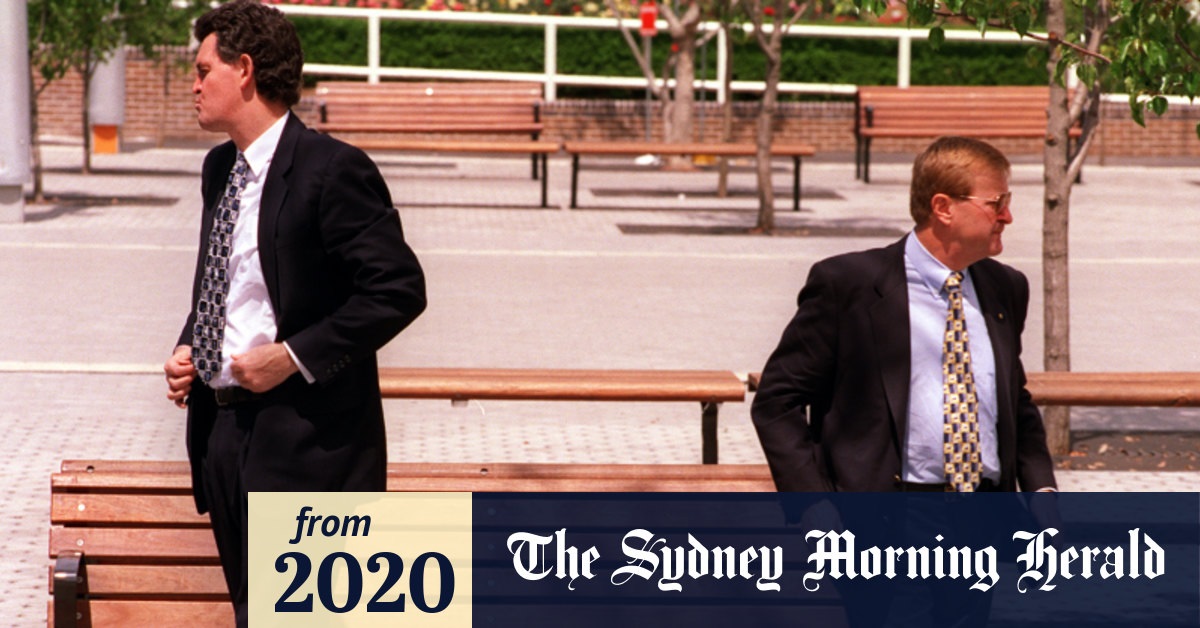
Michel Knight (left) and John Coates (right), photographed after a secret meeting[62]
The agreement that gives the Olympic Committee $100 million and control of the Sports Commission marks the beginning of a firm friendship between Coates and Knight, the two who, in effect, run the Games. This alliance soon proved crucial to Michael Knight’s ambitions to carve out an even more important role for himself, paving the way for his appointment as chairman of the SOCOG board (September 1996) in place of John Iliffe, while retaining his position as Minister for the Olympics[63]. The perception among insiders is that the Games are highly politicised[64].
This decision is followed by a media move: Knight and Coates tell the newspapers that SOCOG is in disarray, unable to manage the Games, and that preparations have barely begun. The resulting headlines say it all: Games in crisis, Knight intervenes[65]. Sandy Holloway is appointed as the new CEO of SOCOG[66] – a Canberra bureaucrat and old colleague of Senator Graham Richardson[67], a central figure of the conservative wing of the Labour Party[68], former Australian Minister of Sport[69], Michael Knight’s mentor and organiser of the ‘Night of the Long Shrimp’[70]. In November 1997 Richardson (a SOCOG board member since 1996[71]) was appointed by Coates as Mayor of the Olympic Village[72].
Richardson’s appointment raised protests from the Liberal Party, which would like to get rid of him if he wins the 1999 election[73]. The Liberals, in the event of victory, want to replace Knight with Rod McGeoch, a major architect of Sydney’s victorious campaign and a member of the SOCOG board. Knight’s mud machine is unleashed[74]. McGeoch quits politics, writes a successful memoir[75], tours the country as a popular speaker[76] and becomes a consultant for Athens’ bid for the 2004 Games[77], with a fee of around a million dollars[78]. Because of this position, he is forced to resign from the board of SOCOG[79].
In mid-November, the Daily Telegraph wrote that McGeoch allegedly demanded a fee of AUD 8,000 to give a speech on the Olympics. A board document, written by Michael Knight, was leaked to the newspaper; this is the first leak suggesting conflicts between McGeoch’s business dealings and his role at SOCOG. McGeoch claims to have known about the compensation when he received a phone call from the journalist involved[80]. The document would therefore be a forgery produced by Knight. Eighteen months before the opening ceremony, work on the infrastructure for the Games is well underway: many of the venues have been completed and Homebush has been transformed from an abandoned toxic waste dump[81] into a model Olympic complex[82]. The resignation of former hero McGeoch is quickly forgotten.
After the party
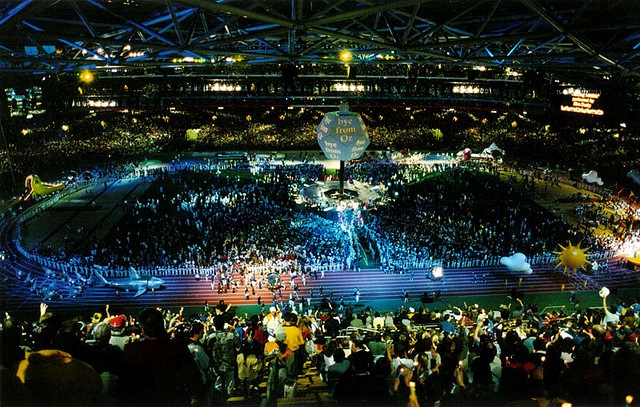
An image from the closing ceremony of the Sydney Olympics[83]
The Sydney Olympics generated losses of $2.1 billion[84]. The city has gained some world-class facilities and the opportunity to host an extraordinary event but, along the way, the Olympic spirit of solidarity, fair play and brotherhood has been lost in the meanders of a sad struggle by the organisers to grab a substantial loot. Australian Olympic sport has emerged enriched: AOC coffers have 88 million Australian dollars left after the Games[85]. John Coates has achieved his goal – at the expense of the Australian people: to have an independent and wealthy AOC.
No one knows how much Coates and Knight earned. All that is known is that they became managers of several investment funds of the Texas-based DFA Dimensional Fund Advisors group, and that they will live an old age without financial headaches[86]. The only effect has been to make even more evident (and, strangely, more accepted) the fact that behind the entire machine of the International Olympic Committee and the individual sports federations (one above all, the very powerful FIFA, which manages the fortunes of football) is a single, monstrous corrupting machine, squandering public money, and that sports competitions, even more today than during the Cold War, are competitions for the affirmation of the nationalisms of the great powers – exactly as was already in the spirit of the Olympic Games in Hellenism. The human being never changes.
[1] https://olympics.com/ioc/pierre-de-coubertin ; https://www.britannica.com/biography/Pierre-baron-de-Coubertin
[2] https://www.dailytelegraph.com.au/news/sydney-olympic-games-15-top-moments-from-the/news-story/1d44b29863399f4c6af6a1c95c1e0057
[3] https://olympics.com/ioc/administration
[4] https://library.olympics.com/default/candidatures.aspx?_lg=en-GB
[5] https://www.economicshelp.org/blog/29/sport/costs-and-benefits-of-the-olympics/ ; https://thesportsschool.com/benefits-of-olympics-for-hosting-country/
[6] https://www.usabaseball.com/news/topic/general/otd-92700-pro
[7] https://worldfilmreviews.us/sydney-2000-stories-of-olympic-glory/
[8] https://cyclingtips.com/2020/08/one-of-the-greats-catching-up-with-dutch-champion-leontien-van-moorsel/
[9] Peter Matthews, “Historical Dictionary of Track and Field”, Scarecrow Press, 2012, p. 107
[10] https://olympics.com/it/atleti/ian-thorpe
[11] https://www.dailytelegraph.com.au/news/nsw/sydney-olympics-from-frogs-halting-construction-to-stadium-built-on-sand-sydney-was-not-immune-to-olympic-host-controversy/news-story/742bd413747d35567001d7ce5004dad4
[12] https://www.canberratimes.com.au/story/6912752/how-sydney-won-the-2000-olympic-bid/
[13] https://library.olympics.com/Default/doc/SYRACUSE/37644/sydney-2000-share-the-spirit-sydney-olympics-2000-bid-ltd
[14] https://www.nsw.gov.au/about-nsw/key-facts-about-nsw#:~:text=Sydney%20is%20the%20capital%20of,the%20eastern%20coast%20of%20NSW
[15] “SYDNEY 2000: SHARE THE SPIRIT”, Vol. 1: General information = Renseignements généraux, Sydney Olympics 2000 Bid Ltd. Sydney, 1993
[16] https://olympics.com/ioc/mr-john-coates-ac
[17] https://olympics.com/ioc/executive-board
[18] https://www.celebrityspeakers.com.au/speakers/rod-mcgeoch-am/
[19] https://www.abc.net.au/news/2021-02-28/brisbane-2032-games-may-be-john-coates-olympic-legacy/13200000
[20] https://www.abc.net.au/news/2021-07-21/brisbane-queensland-announced-as-2032-olympic-games-host-city/100311320
[21] https://www.insidethegames.biz/articles/1078526/an-australian-hacking-it-in-the-olympic-big-time
[22] Christopher Law, “Manchester’s Bid for the Millennium Olympic Games”, in “Geography” Vol. 79, No. 3 (July 1994), pp. 222-231
[23] https://www.upi.com/Archives/1991/03/07/Berlin-officially-bids-for-2000-Olympic-Games/5301668322000/
[24] https://www.nytimes.com/1993/09/24/sports/olympics-there-s-no-joy-in-beijing-as-sydney-gets-olympics.html
[25] https://www.theepochtimes.com/how-sydney-won-the-2000-olympic-bid_3490082.html
[26] https://halloffame.melbournepressclub.com/article/kerry-packer
[27] https://www.afr.com/politics/auditor-general-criticises-sa-public-service-19880908-k3022
[28] https://webarchive.nla.gov.au/awa/19991209130000/http://www.deloitte.com.au/content/socog_report.html
[29] Sheridan Report, p. 33
[30] Sheridan Report, p. 33
[31] https://olympics.nbcsports.com/2014/04/02/2000-us-olympic-baseball-team-tommy-lasorda-doug-mientkiewicz-ben-sheets/
[32] Sheridan Report, p. 35
[33] Sheridan Report, pp. 38-39
[34] https://taronga.org.au/dubbo-zoo
[35] https://nationalzoo.si.edu/animals/przewalskis-horse
[36] Sheridan Report, pp. 47-48
[37] Sheridan Report, p. 48
[38] Sheridan Report, pp. 31-32
[39] https://www.afr.com/companies/how-sydney-won-race-19930927-k5l5q ; Marcus P. Chu, “Sporting Events in China as Economic Development, National Image, and Political Ambition”, Springer Nature, 2021, p.18 ; https://www.latimes.com/archives/la-xpm-1999-may-25-mn-40821-story.html
[40] https://www.scmp.com/article/104884/man-who-beat-beijing
[41] Sheridan Report, pp. 42-43
[42] Sheridan Report, p. 42
[43] Sheridan Report, pp. 43-44
[44] Sheridan Report, p. 46
[45] Sheridan Report, p. 35
[46] Sheridan Report, p. 36
[47] Sheridan Report, p. 36
[48] https://www.mediaintoronto.com/egyptian-communitys-leader-mahmoud-elfarnawany-dies-aged-89/
[49] https://www.smh.com.au/sport/from-the-archives-1993-sydney-wins-olympic-bid-20190911-p52q6u.html
[50] Kristine Toohey, Tracy Taylor, “Australian Sport: Antipodean Waves of Change”, Routledge, 2013, p. 116
[51] https://www.smh.com.au/sport/from-the-archives-coates-of-many-contracts-20200812-p55kxp.html
[52] Kristine Toohey, Tracy Taylor, “Australian Sport: Antipodean Waves of Change”, Routledge, 2013, p. 116
[53] Mark Brabazon, “The Legal Structure of the Sydney Olympic Games”, UNSW Law Journal, Volume 22(3), 1999, pp. 668-69
[54] Mark Brabazon, “The Legal Structure of the Sydney Olympic Games”, UNSW Law Journal, Volume 22(3), 1999, pp. 668-69
[55] Mark Brabazon, “The Legal Structure of the Sydney Olympic Games”, UNSW Law Journal, Volume 22(3), 1999, p. 672
[56] Harry Gordon, “The Time of Our Lives: Inside the Sydney Olympics : Australia and the Olympic Games 1994-2002”, Univ. of Queensland Press, 2003, p. 83
[57] https://www.parliament.nsw.gov.au/members/Pages/profiles/knight_michael-steven.aspx
[58] https://www.parliament.nsw.gov.au/members/Pages/member-details.aspx?pk=2041
[59] https://www.smh.com.au/national/nsw/how-the-night-of-the-long-prawns-shaped-sydney-s-olympic-bounty-20201001-p56134.html
[60] Harry Gordon, “The Time of Our Lives: Inside the Sydney Olympics : Australia and the Olympic Games 1994-2002”, Univ. of Queensland Press, 2003, p. 64
[61] https://www.smh.com.au/sport/from-the-archives-coates-of-many-contracts-20200812-p55kxp.html
[62] https://www.smh.com.au/national/nsw/how-the-night-of-the-long-prawns-shaped-sydney-s-olympic-bounty-20201001-p56134.html
[63] https://www.parliament.nsw.gov.au/Hansard/Pages/HansardResult.aspx#/docid/HANSARD-1820781676-9989/link/1946
[64] https://www.afr.com/companies/ruling-troika-in-socog-empire-19990902-k8y70 ; https://apnews.com/article/3eebf3553b84689dcffd1afcd1197100 ; https://www.washingtonpost.com/archive/sports/1999/01/26/sydneys-main-man-shows-how-its-done/746d75f3-7798-4c2e-a5f8-a8cc67c971bb/
[65] https://www.youtube.com/watch?v=0stuuh6VckU
[66] https://australiansportreflections.com/2021/09/22/sydney-2000-olympic-and-paralympic-games-power-brokers-expect-many-changes-in-brisbane-2032s-journey/
[67] http://www.gwb.com.au/gwb/news/197/2903.html ; https://www.journeyman.tv/film_documents/539/transcript/
[68] https://premiernational.com.au/graham-richardson
[69] https://australiansportreflections.com/2021/09/22/sydney-2000-olympic-and-paralympic-games-power-brokers-expect-many-changes-in-brisbane-2032s-journey/
[70] https://www.smh.com.au/national/nsw/how-the-night-of-the-long-prawns-shaped-sydney-s-olympic-bounty-20201001-p56134.html ; https://www.afr.com/companies/ruling-troika-in-socog-empire-19990902-k8y70
[71] https://www.celebrityspeakers.com.au/speakers/graham-richardson/
[72] Harry Gordon, “The Time of Our Lives: Inside the Sydney Olympics: Australia and the Olympic Games 1994-2002”, Univ. of Queensland Press, 2003, p. 159
[73] https://www.journeyman.tv/film_documents/539/transcript/
[74] https://www.irishtimes.com/sport/sydney-committee-in-disarray-1.218958
[75] https://www.goodreads.com/book/show/4028822-bid
[76] https://www.saxton.com.au/speakers/rod-mc-geoch
[77] https://www.nzherald.co.nz/nz/get-cracking-on-planning-for-rugby-world-cup-says-expert/MQBNXQWLGDV5DAC7QQZ5XSO4LQ/
[78] https://www.youtube.com/watch?v=0stuuh6VckU
[79] https://www.afr.com/companies/mcgeoch-quits-its-personal-19981125-k8fap
[80] https://www.youtube.com/watch?v=0stuuh6VckU ; https://www.afr.com/companies/ruling-troika-in-socog-empire-19990902-k8y70
[81] https://www.latimes.com/archives/la-xpm-1998-feb-24-sp-22525-story.html
[82] https://www.sydneyolympicpark.com.au/
[83] https://en.wikipedia.org/wiki/2000_Summer_Olympics_closing_ceremony#/media/File:Closing_ceremony1.jpg
[84] https://www.researchgate.net/publication/4833453_The_Sydney_Olympics_seven_years_on_an_ex-post_dynamic_CGE_assessment#:~:text=With%20these%20assumptions%2C%20we%20find,loss%20of%20approximately%20%242.1%20billion.&text=Content%20may%20be%20subject%20to%20copyright.&text=Content%20may%20be%20subject%20to%20copyright.,-Eleventh%20Floor%2C%20Menzies
[85] https://www.afr.com/policy/john-coates-independent-olympic-finances-crucial-to-team-success-20170502-gvwypf
[86] DFA Investment on Nexis
Leave a Reply